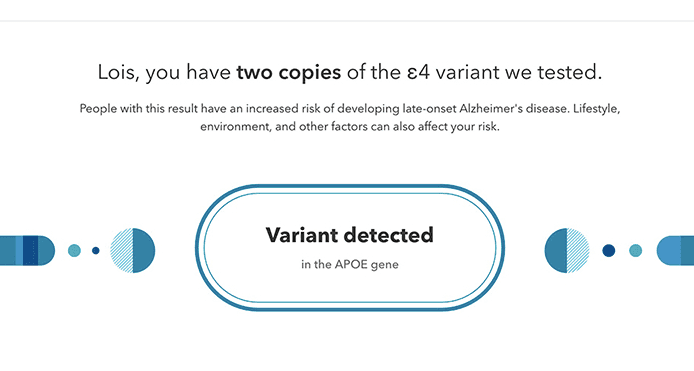Did Your 23andMe Show the ApoE4 Variant?
by Amylee Amos PhD, RDN, IFMCPNews
Late-Onset Alzheimer’s Disease Risk
The 23andMe Health + Ancestry Kit includes many Genetic Health Risk reports, which tell you about genetic variants associated with increased risk of certain health conditions. One of these reports is the Late-Onset Alzheimer’s Disease report, which identifies and informs you as to whether or not you carry the genetic risk variant ApoE4.
Late-onset Alzheimer’s disease is the most common form of dementia. Late-onset Alzheimer’s disease most commonly develops after age 65. Many people confuse this term with early-onset Alzheimer’s disease when they wish to indicate that the cognitive decline is in its early stages, however the terms refer specifically to when the decline begins to develop, not the stage of decline. As the primary risk factor for Alzheimer’s disease is older age, it is unsurprising that late-onset Alzheimer’s disease is the most common form.
While age is the primary risk factor for the development of Alzheimer’s disease, genetics also plays a large role. The ApoE4 genetic variant increases the risk of developing Alzheimer’s disease significantly. Fortunately, there is much that can be done to mitigate that genetic risk, so many people wish to find out if they carry the ApoE4 variant so that they can take early action. On the other hand, there are many people who have never even heard of ApoE4, who get the 23andMe Health + Ancestry kit and are frightened to learn when viewing their genetic health risk report that they carry this variant which puts them at higher risk of Alzheimer’s disease.
What is ApoE?
ApoE is a gene. Three common variants of this gene exist, and they are called ApoE2, ApoE3, and ApoE4. Every person is born with two copies of ApoE. We receive one ApoE gene from each parent.
ApoE variants are relevant to Alzheimer’s disease because the ApoE variants that you carry alter your genetic risk of developing Alzheimer’s. According to the most current research, ApoE2 is the rarest variant and seems to carry the least risk for developing Alzheimer's. ApoE3 seems to carry a neutral risk. According to a large body of evidence, ApoE4 carries a very high risk for Alzheimer's and is one of the strongest known genetic risk factors for Alzheimer's disease. Research shows that ApoE4 promotes the accumulation of beta amyloid plaques in the brain, which are characteristic of Alzheimer’s disease.
The Late-Onset Alzheimer’s Disease report from 23andMe does not identify the ApoE2 or ApoE3 variants. It merely tells you whether you carry 0, 1, or 2 copies of ApoE4.
How Common is ApoE4?
75 million Americans have one copy of ApoE4 and 7 million Americans have two copies of ApoE4. Studies vary, but generally if you take no steps to improve your cognitive health:
- With 0 copies of ApoE4 your risk of developing AD is about 9%.
- With 1 copy of ApoE4 your risk of developing AD is about 30%.
- With 2 copies of ApoE4 your risk of developing AD may be as high as 90%.
Some of these numbers seem very high and for many can be a major source of worry and anxiety. However, it’s important to note that these numbers reflect the data of individuals who have not taken major steps to mitigate their genetic risk.
What Should I Do If I Carry ApoE4?
If you have just found out that you carry ApoE4 through your 23andMe Late-Onset Alzheimer’s Disease Genetic Health Risk report, don’t panic. Risk is not diagnostic. Carrying 1 or even 2 copies of ApoE4 does not necessarily mean you will develop late-onset Alzheimer’s disease. There is now so much research on ApoE4 and we can leverage that knowledge to help you mitigate your genetic risk.
The most important thing to do is to take action immediately. The pathophysiology that leads up to Alzheimer’s disease begins decades before Alzheimer’s symptoms begin. That means that it’s never too early to start working to prevent Alzheimer’s disease.
The expression of ApoE4 is largely dependent on our diet and lifestyle. There are very specific changes in your diet and lifestyle that you should make to begin reducing your risk of Alzheimer’s disease if you carry ApoE4 (and some of these nutrition and lifestyle interventions are specific to carriers of ApoE4, meaning they are not the same interventions that might be recommended if you did not carry ApoE4). Beginning a comprehensive program to reduce your risk of Alzheimer’s disease is something to start up immediately. At the Amos Institute, our Cognitive Health Program is exactly the platform to get you started with optimizing your brain health and reducing your risk of Alzheimer’s disease. It includes specifications that should be made based on whether or not you carry ApoE4, so you can make the interventions necessary based on your unique needs. We offer the ability to get your questions answered by registered dietitian nutritionists and experts in the field of brain health and ApoE4. There is no more comprehensive or cost effective program available to help you prevent late-onset Alzheimer’s disease, even if you are at high genetic risk. Don’t waste another minute- sign up today to begin optimizing your brain health now.
If you'd like to find out your ApoE variants, order the 23andMe Health + Ancestry Kit using this link for 10% off.